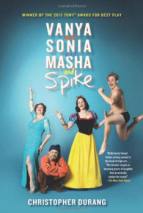ACT CLOSES SEASON WITH A SMASH OF A MASHUP
Seattle’s ACT Theatre closes its mainstage season with Christopher Durang’s latest and greatest; latest because it was written in 2012 and greatest because Vanya and Sonia and Masha and Spike won the 2013 Tony for best play. The play is also the most-produced modern play show of this season; American Theatre Magazine reports 27 productions. This one at ACT officially opens October 23 and runs through November 16, so there’s no need to travel far for this biting, lovely gem.
The title is a reference to the Russian playwright Anton Chekhov. Vanya, of course, is from Uncle Vanya as is Sonia. Masha references both Three Sisters and The Seagull. And Spike is…sort of a world unto himself, a “wild card” as Durang himself describes him. The plot is a blend of all of his plays and is equally as seemingly simple as any Chekhov play: two siblings, unmarried, still live at the family home after the deaths of the parents they’ve been caring for. Neither are sure of what they want to do with their lives, except they both feel that they’ve never done much of anything. Then a second sister arrives on the scene, a successful actress who’s been supporting all of them. She arrives, boy toy in tow (he’s the Spike of the title), and upsets their world when she announces her intention to sell the house right from underneath her two siblings.
Chaos ensues, but of the comedic type that Durang is noted for. Adding to the sibling mayhem are the housekeeper Cassandra, given to outbursts of wild-eyed prophesies (greeted with the same level of skepticism which greeted her famous namesake); and the dewy-eyed Nina, who puts the battle of the sexes on a see-saw. But, one reason for the play’s success is that Durang makes sure that you’re never sure where the play is going.
Director Kurt Beattie, besides directing this cast with confidence and snap, also gets great results from his crew. Standouts include Carey Wong’s set design, which actually captures the feel of misty mornings spent birdwatching over coffee; and Catherine Hunt creates great costumes, running the gamut from comfy bathrobes to great party dresses and costumes. Oh, and great underwear, too.
The cast is almost equally good: R. Hamilton Wright and Pamela Reed give solid, believable performances. Reed, especially, packs energy into her role, reminding us of what a great Martha she was in the recent Who’s Afraid of Virginia Woolf? Cynthia Jones, whose resume includes Motormouth Mabel in Hairspray in Concert and Mrs. Muller in Doubt, essentially steals the show as the alternately wild and pragmatic Cassandra. Syndey Andrews is Nina, the innocent girl next door, who keeps the innocence grounded while keeping her character believable. The young up-and-coming William Poole provides laughs and beefcake as Masha’s boytoy who just can’t keep his shirt on.
To me, though, the real stand out among these giants is Marianne Owen; it’s always a delight to see her, but her performance here is amazing, the best of her career (that I’ve seen.) As Sonia, the adopted daughter, she’s bitter, lonely and frustrated, but never descends into whininess. She slips on a costume for a costume party, and channels Maggie Smith, which begins her own transformation into a warm human being. The transition is amazing and Owen makes it seem effortless. Her performance, alone, is worth seeing. Fortunately, everyone else delivers worthwhile work on their own; this is first-rate ensemble acting.
Durang’s play itself seems to have struck a chord–or a nerve. Chekhov’s plays deal with the emptiness of society reflecting the emptiness of the lives of its citizens. On one level, this play covers the same ground, updated and mashed together; references and elements of his plays are everwhere. But while Chekhov’s plays end in despair and bleakness, Durang’s doesn’t. Rather, he seems to say that, despite all the changes we face, the one constant must be human connection; with that, our lives aren’t hopeless.
Towards the end of the play, Vanya delivers a long, poignant but sharp monologue about all that he misses about growing up: “I miss…and I miss…and I miss….” The list goes on, a vent triggered by an indiscreet text sent at the wrong time. The speech (Wright’s shining moment in a great performance) was met with cheers and applause at the end. A great speech, but also one of the weak spots in the story. Vanya recalls many things but some of them (Howdy Doody and Kukla Fran and Ollie) he would have been too young to remember if he were now at his stated age of 57. I’m older than that and I’m too young to have seen either show live on TV. Unless Durang made that point to bring a sense of timelessness to the piece.
But that was the only weakness in the show and is certainly open to debate. My take-away was summed up by an overheard (sarcastic) remark by a patron as we were leaving: “And I miss the good old days when ACT had bad plays of 3 1/2 hours of political diatribe.” Yes, some things from the past deserve to be missed. This is something from the present which should not.

